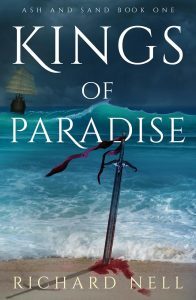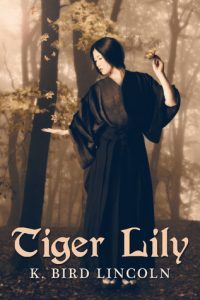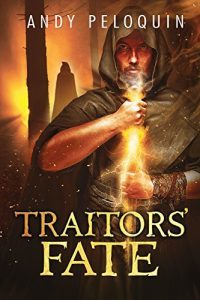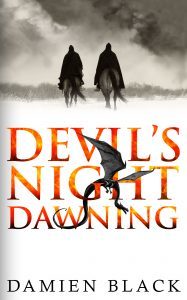Rob J. Hayes's Blog, page 15
June 15, 2018
Review Blog – Darkstorm by M.L. Spencer
Time for a little disclaimer. It is, unfortunately, impossible to really separate the narrator from the words when reviewing an audiobook. But I have tried.
Darkstorm is a prequel of sorts to M L Spencer’s Rhenwars Saga. The author told me this when I started the book, and pointed out that it’s probably not the best place to start the series. However, I was after an audiobook, and book 1 was not yet ready (I believe it will be soon and is probably a better place to begin your journey into the Rhen). She was not wrong. There are points where I found myself a bit lost and confused, and I feel if I had a broader knowledge of the world, it would have all made a bit more sense.
Right, so Darkstorm is the story of 2 brothers, Braden and Quin Reis as they struggle to stop a corruption within their order of mages from opening up a portal to hell. Yup, that pretty much sums up the plot in a single sentence. It’s a mad ride!
The story is fast paced and frantic, with a few big twists along the way, and a hell ( 
May 25, 2018
Review Blog – Paternus by Dyrk Ashton
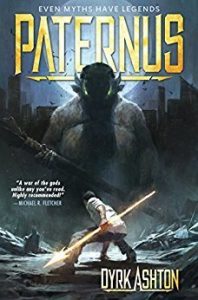
I’m fairly certain Dyrk Ashton is the nicest guy in the fantasy genre. I met him last year at a convention and he handed me a signed copy of Paternus. I graciously accepted, knowing full well it would be a while before I managed to get around to reading it. And now I have, and by the gods I wish it hadn’t taken me so damned long!
Paternus is pretty much about a war between the gods. I actually described it this way to my lass (who will be reading it soon!), and she asked “Which gods?” The answer to that question can only be “All of them!” Now before you start thinking you know how the events in this book will go down… Stop. You don’t. Dyrk plays with myths, legends, history, and scripture, and turns them all sideways. Then he somehow makes them fit together as though that were the plan all along.
It’s a slow start, there’s no doubt about that, but it doesn’t really feel slow. Dyrk does a wonderful job of making us care for the characters right from the get go. There’s an odd mix of perspectives as well, ranging from gods to humans to other things, and though some are more interesting than others, none of them are ever dull. And when the pace does pick it, it doesn’t let up. There’s action in this book that belongs in a Hollywood blockbuster.
But I usually reserve my 5 stars for books that are truly special. Books that add something to the genre, or change the game in some way. And that is exactly why Paternus is getting all 5 of those stars from me. It’s not about characters that I just can’t stop reading. It’s not about a plot that twists and turns its way into a pretzel. Paternus is getting 5 stars because of the style in which it is written.
The book feels like some sort of unholy cross between a novel and a screenplay. It’s written in present tense, littered with exposition, and riddled with info dumps. And I don’t hesitate to say that in the hands of 90% of the authors out there, it would be an unreadable mess. But somehow Dyrk manages to make it work. And not just work, but work so well that it flows beautifully. There were times I didn’t even realise I’d just read a blatant info dump until I finished a chapter and thought back on it. The narrative truly sucks you in and doesn’t let you come up for air until it’s finished with you.
So Paternus gets a glorious 5 stars from me. It’s a compelling story, with a sideways twist on the war of the gods, and it’s told in a fashion that is unique within the genre.
May 22, 2018
Guest Blog – The Illusions of Dialogue by Jesse Teller
The Illusions of Dialogue by Jesse Teller
I came from a family of storytellers, I mean, gifted storytellers. They could pick you up and lift you into a tale like none other I have ever known. I apprenticed under them, and it made me the writer I am. I have been telling stories all my life and writing for most of my life, and at first, the storytelling didn’t translate to the written word.
If I wrote the story as I heard it, it always fell flat. There was no way to transfer the experience of telling a story to writing one. The teller has more tools.
Words don’t make the story. My grandfather had an eighth-grade education. He had a very basic vocabulary. But man, listening to him tell a story was an experience I cannot describe.
Well, I’m going to try.
It was not the words he used at all; it was the way he spoke. He used inflection like a master working a clay pot. He had a grip on the dramatics. He knew when to sip.
Have you ever been listening to a story being told by a truly gifted storyteller, and he stops to take a sip of his drink? There is magic in that moment. The entire room freezes. No one speaks. No one breathes. The sounds of the room drop down to nothing. The TV in the background turns itself down, and everyone waits.
The thing I learned from my uncles, grandfather, and mother is that it is not the words, the sound effects, or even the tone of voice. It is in the pause. The pause holds all the power of the tale. Conversation is this way as well. Magical moments wait within the breath between words. The rhythm of the speaking tells the story in a way nothing else ever could.
Think about great orators. The breaths they take and the way they pause are the magic of the speech.
You don’t believe me. You are looking at me like you don’t believe me. Okay, let’s look at any piece of dialogue. I’m a writer. I happen to have some right on hand. Hold on while I get it.
Okay, I’m back. Did you notice that the period at the end of that last paragraph did not accurately convey the passage of time? Remember that. We are getting to that.
Now, in order to make my point, I’m going to show it to you bare bones and suck the illusion right out of the piece. Yes, my friend, there are illusions in every great piece of dialogue. That is actually why we are here. Just wait.
“I know, you make cheese. You’re a spy. Named Smear. Who makes cheese. Smear, the cheese maker. I would wager a guess that you’re the most dangerous cheese maker this country has ever known,” Rayph said.
“I’ll get better,” Smear said. Both laughed.
“I have to go. Got a thing to do. Thanks for the tea and what-have-you.”
This is the dialogue of a scene I have written. All the conversation is there. Every word of it. I have not changed a letter, not one piece of the conversation.
So, this is what we know now. Smear makes cheese. He is also a spy. He is dangerous and the country knows it. Rayph is leaving, and he has thanked Smear for the tea. We know that. It is right there. But the illusion of talking has been sucked out of it.
No one talks like this. This is totally unbelievable. Sadly, this is what I read a lot of the time. You can’t feel the cadence. You can’t feel the rhythm of the conversation. That is a major problem in writing because we are given crude tools to work with. We have a comma. That tiny piece of punctuation is supposed to imply a pause in the conversation. Well, it doesn’t. What would you say if I told you there is a long pause between the two phrases “thanks for the tea” and “what-have-you”? There is a pretty long pause there. Rayph also takes a breath for effect between the phrase “I know you make cheese” and the phrase “You’re a spy named Smear.” A pretty important pause lives right there. This conversation, like every one you have had, is riddled with pauses for effect and little breaths that give the dialogue meaning and make it worth listening to or reading.
In order to write real and convincing dialogue, we need to feel those pauses. They need to be there, but a simple comma or period will not do. It is too crude a tool. Go back up and read that piece of dialogue again. Feel how stilted it is and how clunky. Now, this is how it actually reads. This is the illusion I wove in it to give it breaths and dramatic pauses:
Rayph nodded. “I know, you make cheese,” Rayph said. “You’re a spy. Named Smear. Who makes cheese. Smear, the cheese maker. I would wager a guess that you’re the most dangerous cheese maker this country has ever known.”
“I’ll get better,” Smear said. Both laughed.
“I have to go. Got a thing to do,” Rayph said. He stood and drained his mug. “Thanks for the tea and,” he motioned to the cheese, “what-have-you.”
No comma in the world is going to change the first version into the second. But if we weave a little magic with tag placement, then we give the illusion of a pause. Look at the first line.
“I know, you make cheese,” Rayph said. “You’re a spy. Named Smear.”
Placing “Rayph said” in the middle of the speech makes the reader pause to read that tag. The thing about tags is they are almost invisible. If you are reading a well-written piece, you don’t even notice them. They blow right by you. When you read that sentence, you don’t even think of the tag. But you have to pause in the conversation long enough to read it. That one beat, the amount of time it takes to read that two-word tag, gives the reader just enough of a breath to make it look like the speaker stopped talking for a moment, thought about what he would say, and said it.
One tag did that. It was not punctuation. It was not a really long period or comma that created the rhythm of the speech. It was a tag.
Let’s keep looking. I want to take a minute and look at the last part of the dialogue. Let’s start here:
“I have to go. Got a thing to do,” Rayph said. He stood and drained his mug. “Thanks for the tea and,” he motioned to the cheese, “what-have-you.”
I needed a longer pause between “Got a thing to do” and “Thanks for the tea.” So, I broke free of the conversation and, just for a breath, described an action. In the time it takes to read that tiny bit of description, the speaker has taken a long pause. I do the same thing between “Thanks for the tea and,” and the line “what-have-you.” In that breath, he has looked at the cheese and has been unwilling to call it cheese at all. He instead calls it what-have-you.
But when I throw in that line of Rayph motioning to the cheese, it gives the idea that he had no idea what to call it. Was it cheese or some other disgusting thing that he ate? Without a pause right there, a break in the rhythm of the conversation, we don’t understand at all.
Great dialogue, like a well-told story or a perfectly orated speech, is filled with pauses for dramatic effect. We can’t use those pauses when we write a conversation, but by using brief spots of description or a well-placed tag, we can create illusions of that same effect as if we were standing in the room hearing Rayph and Smear talk about tea and what-have-you.
About the Author

Jesse Teller fell in love with fantasy when he was five years old and played his first game of Dungeons & Dragons. The game gave him the ability to create stories and characters from a young age. He started consuming fantasy in every form and, by nine, was obsessed with the genre. As a young adult, he knew he wanted to make his life about fantasy. From exploring the relationship between man and woman, to studying the qualities of a leader or a tyrant, Jesse Teller uses his stories and settings to study real-world themes and issues.
He lives with his supportive wife, Rebekah, and his two inspiring children, Rayph and Tobin.
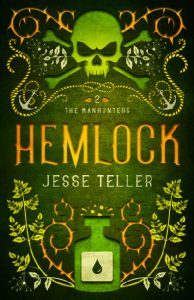
The busiest pirate bay in Perilisc is newly infested with vampires. These monsters will soon overrun the world, but the Manhunters must try to stop them in secret. Agents of the king are hunting Rayph’s vigilante crew. With one false step, they could all end up at a royal execution.
Hemlock is available on Amazon, Kobo, iBooks, Barnes & Noble, and Smashwords.
Praise for The Manhunters:
“Mr. Teller gives us moral dilemmas, fierce and bloody battles, characters that come alive and the power of the magic of words to take us into another place, another time and another reality.”
—Dii Bylo, Tome Tender Book Blog
“This is one of the more fanciful and almost mythical like settings and storylines I’ve read in a while. ” —The Weatherwax Report
“Teller’s world is stunning in its complexity.”
—M. L. Spencer, Bestselling Author of The Rhenwars Saga
“The characters are interesting, the heroes likable, and the villains hateable.”
—booknest.eu
“Has all the ingredients of an exciting, dark fantasy epic: ancient and powerful mages, deadly and vengeful enemies, familial strife, malevolent politicking, and jailbroken criminals hell-bent on revenge.” —Fantasy Book Review
“Jesse Teller only takes his foot off the accelerator to switch to a higher gear.” —The Fantasy Inn
May 15, 2018
Review Blog – Chaos Trims My Beard by Brett Herman
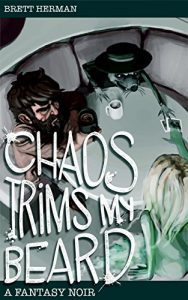
Chaos Trims My Beard has undoubtedly got one of the freshest names in fantasy fiction. Right from the outset you know you’re getting something a bit weird and quirky. This is not ‘serious’ fantasy. This is ‘fun’ fantasy. That’s not to say it’s not serious at times, or that it doesn’t deal with serious issues, but there is an undeniable undercurrent of absurd humour running through it. And for the most part it really works.
Chaos is a noir style novel told entirely in first person from the perspective of one Sandival Beardface… no, wait. That’s his alias. Edwayn Sattler. He’s a half-dwarf with a mighty beard. All dwarves are born with their beards and it’s something of a point of pride for them. He hides a variety of magical gadgets within the thick braids of his beard and deploys them with sometimes reckless abandon. After a bar-tending gig go somewhat awry, Beardface finds himself thrust into a complex plot that threatens to throw society into chaos… but more importantly, the plot threatens his life and his beard. Somewhat reluctantly, Beardface investigates the situation along with a dual pistol wielding rat-man and a dame made entirely out of air.
I’ll point this out right now. The plot is complex. It doesn’t exactly start so, but revelations come thick and fast towards the end and certainly left my head spinning. In fact I feel the revelations and the resulting motivations of the ‘bad guys’ could have used a bit of work. In a fast paced finale full of action I found myself having to re-read bits to try and figure out what it all meant. It kinda pulled me out of the excitement of it all.
The world is a trope ridden cliche of fun and wonder. There are all your basic fantasy races, and they embrace their tropes with gusto. Dwarves love their beards and their forges. Elves are poncy long-lived elitests. Orcs have a thing for axes. Chaos has no shame in playing on the tropes, but always does something a little fresh with them that make them stand out in a good way. A dwarf can never be burned by their own beard!
But the world itself is not typical fantasy. It’s more like a semi-cyberpunk future version of fantasy. The book is set in a highrise city called New Sketlin and there used to be technology in the world, but somewhere along the line it was pretty much replaced by magic. There’s fridgefreezers that run on magic, complete with tiny ball of semi-sentient elemental ice that just loves to ruin food with freezer burn. There’s televisions that run on magic. Lots of modern day tech but all with a magic lean to it. It makes learning about the world quite fun, though there are a couple of times it seems a little overdone.
Character-wise, there are some really fun characters in the book and some that just fall flat. Edwayn himself is your typical noir cliche. He’s a world-weary drunkard with a penchant for being an arsehole, but a loyal heart of gold hidden somewhere underneath it all. He’s exactly what the story needs to drive forward, but that’s about all he was to me. I really enjoyed the rat-man, Venrick the Unabashed. He had interesting speech patterns that helped bring his characters to life, there was a definite air of the gunslinger trope about him, and I love skaven. Doomwheels and Grey Seers and Jezzails… nope, I’m getting off topic here. Back to the book.
The pacing hurt the book. The narrative quite often gets bogged down with descriptions and at those times the story grinds to a halt while the world building takes over. Now the world building is interesting and fun, but it’s often delivered in such a dry fashion that makes it tedious. There were multiple points where after a few pages of reading nothing but the description of a magically enhanced skyscraper, that I was bored enough to put the book down and go in search of a cup of tea (that’s what we English folk do when bored… we make tea). Some of the descriptions were reaching a little far as well, trying too hard to be comical, and it just didn’t work at those times.
Overall I have to say Chaos Trims My Beard was a fun read full of some refreshing takes on old ideas. The rat-man’s multi-purpose guns were definitely one of my favourites. So I’m giving Chaos a solid 3 stars. It’s certainly not my usual reading fare, and it’s far from perfect, but it is beard-strokingly fun!
April 27, 2018
5 Things I’ve learned in 5 Years of Self Publishing
I’ve been at this self publishing game for a while now. 5 years counts as a while for an industry that’s still relatively young. In that time I’ve sold over 60,000 books so I have at least some small measure of success. It’s not amazing, I know, but there was a dark period where I signed up to a small press and everything went wrong. I’m back on track now… just about. In my time playing this great game of writing and selling books, I have learned a few things and I’m going to share some of those lessons. 5 of them.
5. Your book won’t sell itself. Don’t try too hard to sell your book.
I know the two statements sound a bit at odds with each other, but there you. Both are still true. The self publishing industry has exploded over the past few years and these days there are thousands upon thousands of novels out there (and I’m just taking those within the fantasy genre into account). You cannot just release your book into the void and hope it will sell. Think of it like a crowded party where everyone is shouting at each other. There’s a lot of noise. If you want your book to be noticed, it needs to make some noise itself or it will just sit alone in a corner and no one will notice it. But if it makes too much noise everyone will consider it an arsehole and no one wants to hang out with that dood.
People need to know your book has been released if they are to pick it up and read it, but if you try too hard you will turn people off. There is kind of a trick to it and I’m going to talk about that a bit further down. Another thing to take into account is that first impressions are important. Also, while the industry itself is fairly large, the communities are close to one another… and they talk. If you make the wrong kinda splash at the beginning, it is most certainly something that can follow you around. What this all boils down to is this: YOU need to sell your book because no one else is going to do it for you. But don’t be a dick.
4. One of the best ways for a new self published author to sell their book is through the communities.
This one ties in with the one above. I’ve long since come to learn that the publishing industry these days is as much about connections as it is about writing a bloody good book. And it’s not just the “who you know” connections, but the actual act of connecting with people. There are loads of online communities around these days from Facebook groups like Grimdark Fiction Readers & Writers, to forums like Fantasy Faction, to Reddit boards like r/Fantasy. They are an excellent resource and a good way to get your book out there. But much more that, they are a great way to meet people and talk about the things we love… like fantasy fiction.
And here’s the thing a lot of newer authors often don’t get. Simply spamming these communities with links and shouting “Buy my book!” doesn’t work. A lot of the communities don’t even allow this sort of thing anymore, and those that do will find those posts largely ignored. Self promotion is considered a bit of a dirty word, but if you don’t promote your book who will? Well the trick is that there’s a subtlety to it. It’s pretty simple really. Just interact with the people in these communities as another member of the community. Feel free to mention your book from time to time, when it is relevant, but not with every comment. Just talk to people, discuss what you like about the genre, this author, that book. If your own work fits into the conversation, mention it. You’ll find yourself much more likely to make a sale from someone you’ve actually connected with, than a bunch of people just scrolling through the feed and seeing yet another “BUY MY BOOK!”
It’s not a guaranteed way to make it big by any stretch, but actually being a part of these communities is a far better way of getting your name out there than being that drive-by self promoting dood everyone just ignores.
Along with these online communities, and part of the whole making connections thing, comes book bloggers. Book bloggers are one of the best ways to get your book heard about. These wonderful people dedicate time and effort to reading and reviewing books and often have hundreds (or sometimes even thousands) of people following them and their opinions. Making connections with, and maintaining the relationships with, these mythical creatures is another good way to get your books heard about. And I have the trick to that as well. It’s actually quite simple. Just remember that they, too, are people. People who love reading, who love fantasy. They’re actually quite easy to talk to because you’ll soon realise you probably have a lot in common, starting with the love of the genre. At this point in my career I have a number of bloggers I converse with on a fairly regular basis, and while I do often talk to them about my own work, more often than not we actually discuss what we’ve read recently, the latest book releases, or an exciting upcoming release (which they’ve usually already read because they get books early).
These bloggers will often frequent the communities and that’s a good place to interact with and get to know them. Many also have websites and even ways for you to submit a book for review. Just remember that not all bloggers are willing to read self published titles and even those that do probably have a to be read pile miles long. Getting on to those reading lists isn’t always easy, but you’re far more likely to be accepted if the blogger has already interacted with… such as in one of the online communities.
I feel I may have hammered this point home enough by now. I’ll move on.
3. It’s a marathon, not a sprint.
What I mean by this is that it can take time… A lot of time, to get a self published career off the ground. With the sheer number of books around these days it is almost unheard of for a new self published fantasy author to release a book and suddenly find themselves selling thousands of copies and being the talk of the town. Yes, it happened once or twice with the likes of Anthony Ryan, but things have changed and that kind of quick success is rare. You need to dedicate plenty of time to marketing your book and accept that it might be months or even years before you’re selling a decent number of copies.
Leading on from this point is that, if you are intending to make a living from self publishing within the fantasy genre, you are very unlikely to do so without a catalogue of books for sale. The possibility of making a good living from a single book is low. I mention this because it’s important to set realistic expectations. At this point in time I have 8 books for sale in my own catalogue and I just about make liveable earnings from sales across all of those books. Most self published authors give a single piece of advice more often than any other: Don’t give up the day job. It’s fair advice. But don’t stop dreaming.
2. Momentum is important.
I’ll start off this point with a short anecdote. My first 2 years as a self published author went very well. I think my books somehow rode the wake that the Game of Thrones popularity spike left behind. I basked in my sales and decided to write something completely different. Instead of dark fantasy like my debut trilogy, I wrote a fun light hearted steampunk novel. It did not sell well and many of those who did buy it complained it was not in the same tone of my trilogy. I compounded my foolishness by signing with a small press and letting them re-release my trilogy. So 3 years after my successful debut, I released a book that wouldn’t really appeal to the same fans, and then re-released the same trilogy. The momentum I had built up came to grinding halt. I’m still trying to recover from that halt.
It’s a bit of a cautionary tale and it won’t apply to everyone, but if you do manage to pick up momentum with your books, it’s important to continue that momentum. If you sell well with a dark fantasy novel, write another one. Give your fans more of what they want. That’s not to say you shouldn’t maybe switch your genre up a little down the line, but it’s probably not too wise when you’re just starting out. It’s also fairly important to keep releasing new material. Trust me, re-releasing the same books again doesn’t do much for generating interest. I’m not saying rush out a new book before it’s ready, but as a self published author wanting to make a career out of it, it’s pretty important to have at least semi-regular new releases.
1. Invest in your work.
If you’ve read all the way down here I’ll point out now that these pieces of advice are in no real order. I’m not saying this is the most important piece of advice I can give, but it certainly matters. I know a lot of self published authors will say they don’t have spare capital to invest into making their work as good as it can be. To those people I then suggest perhaps approaching small presses. If you wish your book to sell, and want it to be successful, it is important to invest properly into it. In terms of money, time, and effort. The book is your creation, your work, released unto the world. Treat it like a child. Give it the best possible chance of succeeding, even in a world that seems designed to make it fail… Sorry, I went a bit fatalistic there.
First off, hire an editor. They are expensive. They are worth it. At the very least an editor will find the typos you’ve missed (yes, you will have missed typos). If you’re willing to fork out a bit more a good editor will help you craft the book into a better experience for the readers. I did not hire an editor for my debut trilogy, but I wish I did. For the follow up duology I found someone who helped me significantly improve the books, both with correcting my grammatical errors (there were many), but also by streamlining the prose and making useful suggestions.
Get a good cover. As much as might like to deny it, we all judge books by the cover. A cover should make potential readers check out the blurb, the blurb should make them look inside the book, the look inside (first page) should convince them to buy the book. Cover art is important and so is cover design and quite often you will not find both available from the same person. But the more professional you make your book look, the more likely people are to check it out. Want some proof, here’s the full range of covers for my debut trilogy with original covers at the top and current covers at the bottom. Which ones would you be most likely to check out?
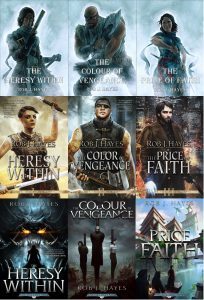
Leading on from the last bit. Slave over your blurb and first page. Make them stand out, make them interesting, make them pop. The blurb should set the scene, introduce the major player, and have a couple of good hooks that will draw people in and make them want to know more. Posing mysteries is a good way to hook readers, and very popular at the moment is including a tagline like you used to find on movie posters. Writing blurbs is hard work (often harder than writing the book), but also just as important as getting a decent cover. Try studying the blurbs of current successful titles and emulate the style.
Those are my 5 lessons that I have learned. Not all of them, but some of them. Maybe I’ll do a 10 lessons in another 5 years time. Hopefully some people will read these lessons, take the advice to heart, and not make some of the same mistakes I have made. I have made quite a few. I’m probably still making them. Here’s a final point. There is no definite road to success and each person’s journey is their own. The advice here applied to me (still does), it might apply to you. Or it might not. I’m pretty sure I’m rambling now so I’m signing off.
March 29, 2018
Review Blog – Sufficiently Advanced Magic by Andrew Rowe
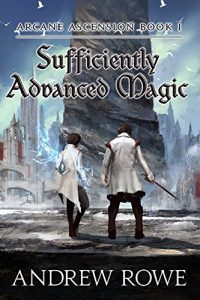
Sufficiently Advanced Magic (SAM) is currently a finalist in this year’s Self Published Fantasy Blog off (SPFBO) and you can find out more about the initiative by clicking here. This is, in fact, the reason I picked it up. It’s not my usual cup of tea, but I’m reading all the finalists this year and I’m glad I made the effort.
So SAM is the result of taking Kvothe, Hogwarts, Diablo (the video game), and anime (in general) and throwing them all into a blender. OK, not really, but it’s not that far off. The main character is very Kvothe-like (though not quite as annoying), the school is very Hogwarts-like (and not just because it’s a school that teaches magic), the magic system is very video-game like in its mountainous detail of attunements and tiers and levels, and there’s anime influences ALL over the book. Yes, I see you, Itachi and your Sharingan all over that epilogue. None of this is a bad thing, I’m just drawing all the customary comparisons in one paragraph.
The story follows young Corin Cadence in a 1st person PoV. Corin is not your usual hero in that he’s not the most combat proficient character (except when he is), and he has a habit of over analysing everything instead of the normal hero trait of jumping straight in with both feet and hoping things turn out fine. His analysis of each and every situation occasionally grated on my nerves, but for the most part he was a serviceable hero, though not the most likable of chaps. Truth is, you don’t always have to be likable. I detested Jalan (Prince of Fools) for 2 books and still loved them, and Kvothe (Name of the Wind) may be my most hated protagonist in all of fantasy yet I still have read both his books.
Corin is determined to either find his missing brother, or ask the goddess to bring him back to life in the case he is dead. His brother was lost in the tower years ago. Towers are magical places of testing where people are pitted against puzzles and monsters and can earn magic and items and money for successfully climbing to higher levels. They’re also run by fragments of the goddess who appear to be entirely separate from her. After earning his first magical attunement, Corin then goes to magic school to learn to use said attunement. And from there things go a little sideways as Corin finds himself embroiled deeper and deeper in a spiraling plot that threatens the kingdom, and maybe even… the world!
This book was a little more YA (young adult) than I was expecting. I don’t tend to touch the genre because I find it frustrating. And at times I certainly found SAM frustrating, but those moments were overshadowed by the “ooooooh” and “aaaaaahh” moments. Even though Corin doesn’t like touching people or being touched, there’s a fair few periods of him pontificating about his feelings over XY and Z. All in all, a bit more YA than I’m used to, but not enough to put me off.
The magic system is intricate. Clearly a lot of time went into designing it, and a lot of time goes into explaining it (it even comes with diagrams in the book). It’s complex and obviously inspired by video game mechanics. At times it feels a little overpowered with people teleporting all over the place, but it fits well within the context of the story and allows for a lot of cool moments.
I must admit I found the pacing a little off at times. The book slows right down in the middle with lots of exposition as magic systems and political borders and history lessons are all delivered in the form of lectures, both to the characters and to us. It makes for a few dry chapters, but there’s usually a monster attack or puzzle test for our characters at the end of those chapters which soon makes you forget about the lecture. Pretty cool monsters all round as well, with a large scope for more as the series progresses. The action scenes themselves often feel a bit slow as well due to Corin’s analysis of everything. It sometimes felt like everything was happening in slow motion with plenty of time for him to describe possible outcomes.
The writing is excellent. It’s my first time experiencing Andrew Rowe’s own particular style and I felt it fit the story and world very well and did the job nicely. There were a few times I felt a joke or quip was a bit forced, but they were few and far between.
And while I won’t go into spoilery details, I will say the finale was blistering and exciting and vivid. There was a goosebumps moment in there so definitely worth the read.
I’m giving SAM a solid 4 stars. I really enjoyed it and eagerly look forward to the sequel. If you like video games, anime, or Harry Potter give this one a go right now!
February 26, 2018
Confessions of a fantasy author – Richard Nell

Confession time again, heathens. Another fantasy author has stepped up and offered themselves on the altar of sin. Richard Nell, author of Kings of Paradise, is here to be judged.
In university I hung out in bad poetry ‘bars’ with other youthful idiots like me, mostly dressed in black like we were Johnny Cash. I wrote ‘deep’ ‘meaningful’ (pure garbage) poems. We snapped our fingers rather than clap. I did this entirely to meet girls.
When I was a kid I loved a young adult romancy fantasy story involving a unicorn. I was old enough to know this was not even remotely cool, so I tore off the covers and hid them in my room, because I couldn’t bear to part with the book. Now I can’t remember what the hell it was, but I wish I did.
I always wanted to write but I knew I was a lazy, undisciplined shithead who couldn’t hack it, so I did crappy jobs and acted like a normy. It took 15-20 years to feel remotely ready, at which point I quit my real, grown-up job at an insurance company without a single word written, with 0 knowledge of self-publishing, no social media, and no encouragement from really anyone that I could do this. I then spent 2 years writing a 200,000 word fantasy book living entirely on savings.
When I’m tired/uninspired my writing starts to look either a) like a Samuel Coleridge poem (rhymes and all), or b) something out of the bible (And such and such happened. And then so and so did something. And then…). I also constantly screw up apostrophes (god damn it’s), and homophones like weary/wary.
I’ve written a couple ‘erotica’ short stories, as yet unpublished, and I discovered the real reason the industry is dominated by female authors. It’s, uh, uncomfortable for a man to try and write about sex all day. Physically. You might say it’s too strenuous. Too hard, even.
I have never queried an agent, or sent anything to a publisher (except Amazon) in my life.
Until publishing Kings of Paradise, I’d never heard of the term ‘Grimdark’. I actually didn’t even think of my book as ‘dark’, exactly—though it does have moments of darkness. Apparently other people are a bit gentle, or I’m a raving lunatic.
Richard Nell concerned family and friends by quitting his real job in 2014 to ‘write full-time’. He is a Canadian author of fantasy, living in one of the flattest, coldest places on earth with his begrudging wife, who makes sure he eats.
His debut novel, Kings of Paradise, is the first of an epic, coming-of-age, low fantasy trilogy, and a Canadian Amazon best-seller in dark fantasy. It’s available now.
He also writes flintlock fantasy! Join his mailing list for news on finished work, freebies, and the occasional philosophical rant.
An island prince searches for meaning; a deformed genius struggles to survive. In a changing world where ash meets paradise, only one man can be king…
Ruka, son of Beyla, is a monster. Single-born, twisted, and ugly, Ruka has the bright, golden eyes of a wolf. But his mind is as vast as the open sea.
Born in the frozen, snow-covered wasteland of the Ascom—the land of ash—Ruka was spared from death at birth by his mother’s love. Now, he is an outlaw, and dreams only of vengeance. But can a broken genius find redemption? Can he fulfill his mother’s dreams, and use his gifts to change the world? Or once he has it in his grasp, will he simply break it apart?
Across a vast sea is the white-sand island paradise of Sri Kon.
There, Ratama Kale Alaku is fourth and youngest son of the island monarch men call the Sorcerer King. At sixteen, Kale is a disappointment. His father has sent him away to the navy, perhaps in hopes of salvaging a once-promising child, or perhaps just to get rid of him.
Now Kale must prove his worth – not just to his father, but to himself. He must become more than just a wastrel prince, and quickly, or else lose all hope of purpose, or love.
And though Kale does not yet know how or why, he stands on the cusp of discovery. For his path, his ‘Way’, is perhaps the only hope for his family, his people, and as the storm gathers in the land of ash, maybe the world itself…
February 18, 2018
Review Blog – Tiger Lily by K. Bird Lincoln
Tiger Lily was full of ups and downs for me. On one hand I loved the setting and concept of kami (spirits) at war with humanity due to religious persecution, and I thought the gender issues were very well handled. On the other hand the main character, Lily, was so damned frustrating!
The book is written in first person and so we ride along in the head of Lily-of-the-Valley, a young lady born in the year of the Tiger. It’s important to note that birth animal effects the person’s personality in this alt history world. Tiger girls are head strong and rebellious and possibly lucky or unlucky. And apparently most Tiger girls are killed when born for the simple crime of being born in the wrong year… I think. I’m not clear on that last part as it was brushed over pretty quick. So Lily is head strong, except when she’s meek. She’s rebellious, except when she’s pliable. And she’s lucky, except when she’s not. And we hear it all going on in her head all the time. The way she flip flops from one decision to the next, her turmoil over whether the prince likes her or is just mocking her, the sheer and utter confusion she feels over pretty much everything. In some ways this works quite well; there’s a fairly traumatic scene roughly 50% of the way through and Lily’s pain and subtle distance are handled within her inner narrative very well. In other ways I found myself putting down the book and going to make a cup of tea out of frustration.
Here’s what this book boils down to for me. Yes there are gender issues, yes there is the backdrop of a supernatural war, yes there is traumatic experiences. But the book is about a girl suffering from anxiety in the Ashikaga (?) period of Japan. You can see it in the way she constantly questions her decisions and actions. You can see it in the way she alternates between praising herself and crushing herself for what she considers her own stupidity. You can see it in the way she blames herself for things that are entirely beyond her control. But the constant tirade of mental anguish was overdone to the point where I often considered putting down the book out of annoyance. Well, that and the author’s odd obsession with describing the smell of people’s breath.
I loved the setting and the concept of the kami and their being pushed out by the spread of Buddhism. I thought the magic of song was a pretty cool one, though I’d have liked some more variation; different songs for different situations. I thought some of the issues the book brings up are handled very well and the story was enjoyable for the most part. But I truly struggled with the inner monologues of the main character. So I’m giving Tiger Lily 3 out of 5.
February 12, 2018
Confessions of a Fantasy Author – Andy Peloquin

Gather round sinners. Another heathen has stepped into the confession booth to seek forgiveness. Today, Andy Peloquin, author of Traitor’s Fate: A Queen of Thieves, bares his soul. His book releases tomorrow and is no doubt filled to the brim with his sinful words.
I, of course, am absolutely perfect, and thus have no embarrassing confessions to make. This blog post has been a waste of your time. Have a lovely day.
(Rob: No sinner can hide from our judgement. CONFESS!)
I suppose the first confession would be that I’m absolute rubbish at writing humor. Some of my favorite books are humorous—Terry Pratchett, Douglas Adams, and Dave Barry—but any time I attempt to write humor, I end up being snarky and sarcastic rather than funny.
I wrote my first short story at the age of 10. The title: “Tally the Tigermaster”. (WTF is a name like “Tally”?) It had everything: the circus, great flair, a near-fatal tiger bite, and a definite “come to Jesus” moment. Thankfully, no trace of that garbage story remains to this day.
My first attempt at a novel began when I was 15. I had too much free time and nothing to do, so I sat down to write the GREATEST ACTION MOVIE NOVEL EVER. Think the car racing of Fast and the Furious, the martial arts of the Matrix, and the guns and fast-paced action of James Bond. I got six chapters into the story before realizing it was garbage and deleted it immediately. The world was spared my teenage nonsense.
I didn’t play Dungeons and Dragons or read comic books until I was 19 years old. At which point, I promptly became a massive comic book and D&D geek—and never looked back since!
To this day, I still struggle to stop my characters from nodding and shaking their heads every other sentence. I have to force myself to find other ways to express agreement or disagreement instead of relying on simple body language.
Commas are both my best friend and worst enemy. I still have yet to master of art of when and when not to include them. My editor says I use them 40% too much. To my mind, I don’t use enough. I am barely on speaking terms with colons, semi-colons, and em dashes—they’re just so hard to get right!
My idea of great poetry is the following masterpiece by Red Skelton:
“Algae saw bear,
The bear saw Algae,
The bear was bulgy,
the bulge was Algae“
I do not understand a lot of what people call art. While I can appreciate beautiful colors, if the image doesn’t make sense to me, it irritates me no end.
I have Asperger’s Syndrome.
(Rob: I’m fairly certain that last one is not a sin.)
About the author:
I am, first and foremost, a storyteller and an artist–words are my palette. Fantasy is my genre of choice, and I love to explore the darker side of human nature through the filter of fantasy heroes, villains, and everything in between. I’m also a freelance writer, a book lover, and a guy who just loves to meet new people and spend hours talking about my fascination for the worlds I encounter in the pages of fantasy novels.
Fantasy provides us with an escape, a way to forget about our mundane problems and step into worlds where anything is possible. It transcends age, gender, religion, race, or lifestyle–it is our way of believing what cannot be, delving into the unknowable, and discovering hidden truths about ourselves and our world in a brand new way. Fiction at its very best!
One Death Changes Two Cities Forever
Ilanna, Master of the Night Guild, has waged a war for eight years to cleanse her city of the rival criminal organization that nearly destroyed it. When she uncovers a ring of slavers trafficking young girls for sexual servitude around the continent, she is forced to venture into the city of Voramis, the seat of her enemy’s power, to hunt down the true culprit and put an end to the enslavement of innocents.
But her enemies will not be so easily eliminated. She must turn to the one man certain to get the job done: the Hunter, legendary assassin of Voramis.
The Hunter willingly accepts a fortune in gold to kill one of the richest men in his city. A mansion fortress and a private army should prove no match for his inhuman abilities.
But as he stalks his target, he unmasks a bloodthirsty conspiracy in the guise of a holy mission. If he doesn’t stop the men responsible, the gruesome murders will continue and people—including those he has sworn to protect—will die.
Fans of Brent Weeks, Brandon Sanderson, and Joe Abercrombie will devour Traitors’ Fate!
February 8, 2018
Review Blog – Devil’s Night Dawning by Damien Black
Devil’s Night Dawning (or DND) is a fantasy book heavily rooted in real world history. What I mean here is the dominant religion feels very much like Christianity, and clearly borrows from it in many circumstances, and the world itself is a classic European medieval setting. We follow along behind a bunch of characters ranging from monks performing exorcisms, knights doing knightly things, and a young noble woman trying to escape the arranged marriage laid out for her. All the while there is the threat of something unfathomably evil lurking behind the scenes, setting events in motion, and plotting the end of the world.
So it sounds like it hits on many of the classical fantasy tropes… and it does. Perhaps a little too much for my liking. DND is well written and the author clearly has not only a wonderful grasp of the English language (plenty of words in this tome I didn’t know until Google saved the day), but also the know how to form those words into elegant descriptions. Not only that but the level of world building he has put into the series is on a level with Sanderson. It’s actually baffling how much history Mr Black has created around this world. Unfortunately the delivery of that world building often felt a bit dry to me. I regularly found myself reading about how sir Whatshisface fought against lord Whosthatnow in the battle of Getoffmyland, but I rarely felt like those history lessons had any relevance other than window dressing. It left me occasionally feeling like I just wanted them to get on with the story. I’ll stop to point out right now that this just means that type of world building wasn’t for me… in the same way that much of the world building in Lord of the Rings isn’t for me. It’s very well done, it’s just not the sort of style I personally in a book.
The characters were a tad hit or miss for me. Our main protagonist, monk in training Adelko, just felt flat. He rarely developed any personality beyond meek farmboy following along behind Wiseoldmaster. That being said, his supporting cast of Wiseoldmaster and Oddlyarrogantsquire were very enjoyable to read. If fact, the tale of the two monks and the squire was by far the best bit of the story. The exorcisms in this book are excellent. In fact, the monster hunting, as it were, is excellent. It’s reminiscent of the Witcher (the games… I’ve not read the books yet) in many ways, in that there’s a variety of demonic beasties in the world and they require different methods of banishing. I loved this. In fact, I kinda wish the book was all about the monks travelling the land finding various evil entities and banishing them back to the fiery hell whence they came.
Which brings me to the reason this one is getting 3 stars instead of 4. It felt like 2 disjointed books. The first was this thrilling tale of exorcism and demonic pursuit as two monks travel across the lands to warn the world of the coming apocalypse. And the second was a book about knights doing stuff. You can probably tell which of the 2 parts fell a bit flat to me. I just never really got on with the knights and their plight, and every time we got a chapter from them I found myself having to remember who was doing what and where, and also just wishing we’d get back to the monks and whatever beastie they were going to exorcise next.
So I’m giving DND 3 out of 5. I enjoyed it, but it’s a tale of two stories and I wanted more of one and less of the other.

